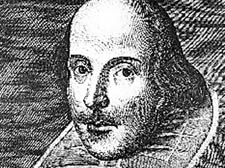|
|
 |
| |
 William Shakespeare William Shakespeare |
Did you know? A secret history for the Bard’s birthday
The Oxford Companion to Shakespeare is the book with which to celebrate the Bard’s birthday this week (April 23).
It is crammed full of delights. I shall only be able to tempt you with a few. The photographs alone are worth buying it for.
Did you know Sir Donald Wolfit, the last great actor-manager and “reckoned the greatest Lear of his time”, played him at the King’s Theatre in Hammersmith (demolished long ago)?
This was in the middle of the 1950s. I was a schoolboy of 16 at the time, completely awe-struck by this demonstration of ham-acting at its greatest and most grotesque, whereby none of the other actors was allowed to shine in any way, including Wolfit’s wife.
Years later I discovered that both Harold Pinter and Ronald Harwood had learned their trade as playwrights as actors with walk-on parts in Wolfit’s company. Could you imagine such a thing happening today?
As a schoolboy, I was equally in awe of Sir Laurence (later Lord) Olivier’s three remarkable Shakespeare films. His second film as director and star was Hamlet (1948), shot in black and white. It is well worth getting hold of the DVD. Perhaps Olivier’s greatest triumph on film was Richard III, playing “the hunchback with a relish that has been much imitated”.
Olivier’s greatest moment of glory, which would have made Wolfit sick with envy, was when his memorial service in Westminster Abbey was televised like a Royal event. Did you know this great trickster-actor’s chosen epitaph, recalling his Hamlet, was “Goodnight, sweet Prince”?
Did you know Sir John Gielgud played Hamlet more than 500 times? And that the rivalry between him and Olivier reached such a pitch in I935 in Gielgud’s production of Romeo and Juliet, with Peggy Ashcroft and Edith Evans, that “Gielgud played Mercutio to Olivier’s Romeo, then after six weeks the two switched roles, highlighting their contrasting vocal styles”?
Did you know Gielgud was in a dark version of Measure for Measure in I950, directed by Peter Brook, “the most influential theatrical interpreter of Shakespeare in the second half of the 20th century”, and the most innovative? He was back in Stratford “for a remarkable Midsummer Night’s Dream in I970, his most widely seen and admired work, which emphasised the bestiality of Titania’s love for Bottom-as-ass but was filled with athletic acting, trapezes, circus tricks, and a joyous celebration of the idea of performance”.
The most fascinating account of one of Brook’s many experiments is John Heilpern’s Conference of the Birds (Faber), in which Ted Hughes, the great poet, interprets the experience of a black blind man coming out of the Metro in Paris as if it were a dream.
Hughes had once chided his wife Sylvia Plath “with knowing only thirteen of Shakespeare’s plays”. In his reading and writing he always returned to Shakespeare.
His own mythic and mystic obsessions, focusing mainly on Venus and Adonis and King Lear, became so great in his book Shakespeare and the Goddess of Complete Being (1992) that some critics at the time were convinced he had gone round the bend. He hadn’t at that time published Birthday Letters.
Did you know that “the unidentified, disembodied, recorded voice of the dead poet reciting the dirge from Cymbeline was heard on the final moving moment of Hughes’s memorial service in Westminster Abbey on May 13, 1999?
Last, did you know Paul Scofield, who recently died aged 86, was arguably the greatest and most self-effacing of all actors?
He started his career at the Birmingham Repertory Theatre playing the Bastard in King John under the direction of the young Peter Brook.
Later he “was an intractable King Lear”, also directed by Brook. He was “an intensely private man”, who is rumoured to have declined a knighthood.
JOHN HORDER
|
 |
|
 |
 |
|
 |
|



